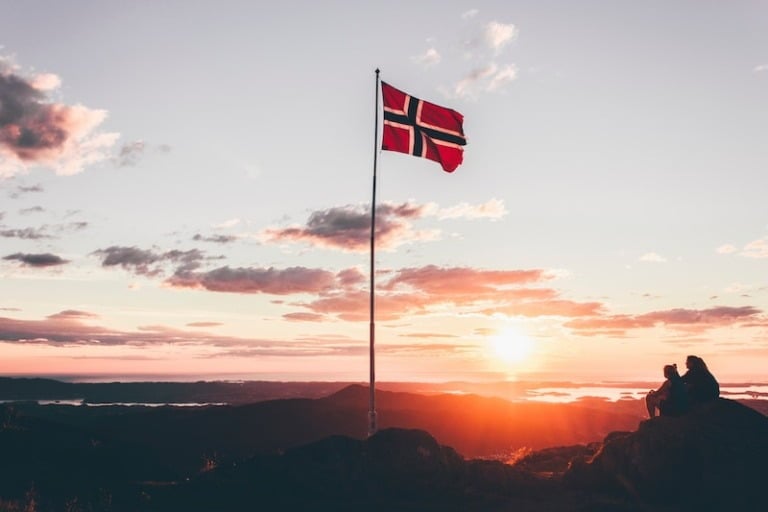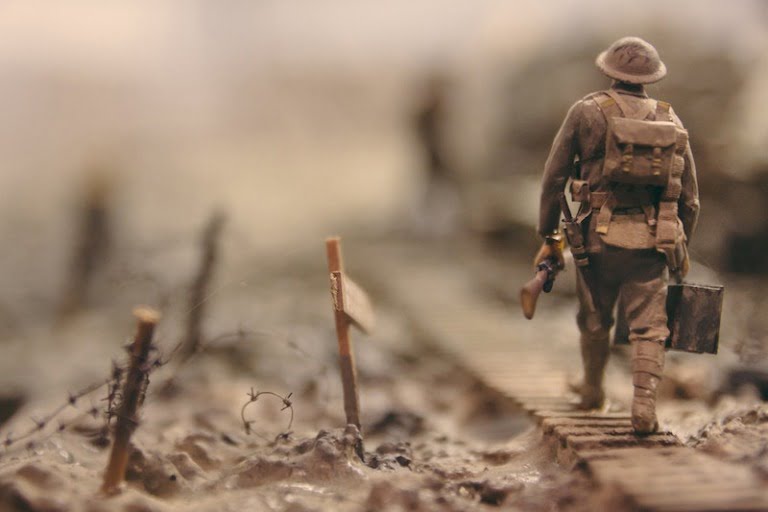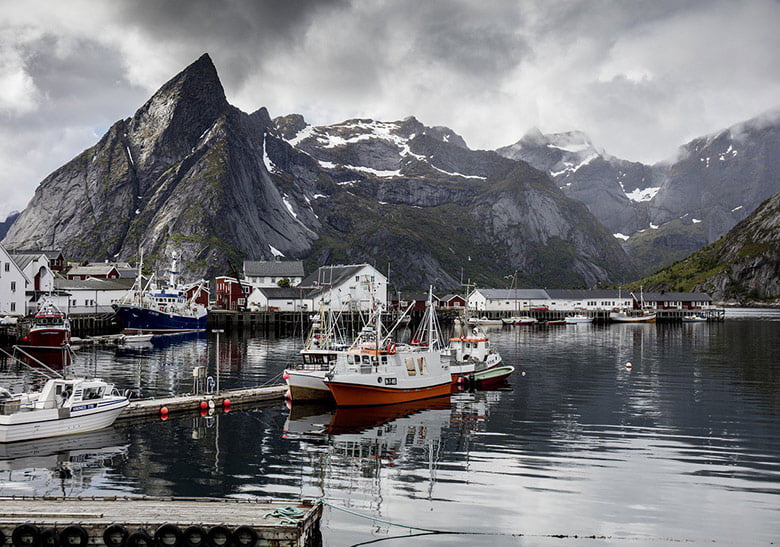The story of how the Great War came to test Norway’s declaration of neutrality.
In 1905, Norway finally regained its independence as a sovereign nation. Centuries of unions with some combination of Denmark and Sweden, through either choice or necessity, had finally come to an end.
It was time for Norway to decide how it wanted to present itself as a country on the world stage. Even though a world war was not necessarily inevitable, Europe at the time still had a tendency towards conflict. Many historians report of ‘a sense that war was coming’.

In the years leading up to the war, two major alliances accounted for the vast majority of the European population. Norway, in the middle of the two sides and with no real grudges to bear, chose the sensible option of neutrality.
Being on the Northern edge of things, and perhaps being seen as a remote place by many, allowed Norway to stand back and avoid fighting for other people’s causes.
Read more: Norway in World War II
It was, after all, more important to get on with the business of being a country than helping others with some centuries-old argument that had nothing to do with them!
The outbreak of World War One
Obviously, the causes and effects of the first World War are beyond the scope of this story, but it’s important to bear in mind the role that alliances played. When Serbian nationalists assassinated Austrian Archduke Franz Ferdinand, war was not inevitable.
Instead, Austro-Hungary felt that Serbia was involved in the attack and, backed up by Germany, issued an ultimatum of near-impossible demands. Russia started ‘pre-mobilising’, getting ready to defend its ally Serbia.

When Serbia rejected the demands, Austro-Hungary declared war on Serbia, Russia declared war on Austro-Hungary and France, an ally of Russia, declared war on Germany.
When Germany violated Belgian neutrality by invading it to get to France, Britain, an ally of France and Russia, also joined the conflict by declaring war on Germany.
Within a month of the assassination, almost all of Europe was involved. But Norway was still neutral.
The dilemma of neutrality
Being a neutral country is easy in theory and it’s especially easy in peace time. But when a conflict breaks out it becomes hard not to pick a side. There are three main reasons for this.
Read more: A Brief History of Norway
Firstly, victory for one side will usually align more with your own goals. Obviously, it depends how much difference there is as to how much this affects you. You may be fine, or you may be completely not fine no matter what happens!
It’s also likely that you’ll have something that is needed by one of the sides. In this case they’ll likely approach you and try to convince you that you can lend certain assets out without compromising your neutrality.
Finally, and perhaps most importantly, one side will likely have something that you desperately need. Maybe goods, fuel or natural resources – most countries aren’t actually able to be 100% self-sufficient.

So, while it’s easy to be neutral in theory it’s a lot harder in practice. Even though Norway was a neutral country in terms of war, in trade terms it was very much within the British sphere of influence.
In other words, if anything went wrong, there was a sense that Britain would likely be the country that came to Norway’s aid.
Getting close to Britain
Once war broke out, Norway restated its neutrality and mobilised its forces to protect that neutrality.
They then carried on as before, doing whatever they could to keep running, with war starting to be fought to the South. War brought a little initial panic but on the whole the country carried on as normal.
Like much of Norway’s history, what happened next comes down to ships…and global commerce. At the time of the war, Norway’s merchant navy was the fourth largest in the world overall and, in terms of carrying capacity per person, actually the largest.
Of prime importance is the fact that Norway imported to and exported from both Britain and Germany and had no desire to stop either. Some of Norway’s major exports were fish and fish-related products (fish oils etc) and copper. Meanwhile, imports were dominated by fuels such as coal and oil.
The fuels were vitally important for keeping both Norway’s industries and the merchant navy running. And most of the fuels came from Britain. Once Britain successfully secured the North Sea as a military zone under their control, they had two main levers to use to ensure Norwegian compliance.
So, even though Norway was a neutral country able to trade with both sides, the trade became so heavily skewed towards Britain that Norway was, in some ways, starting to appear like a neutral ally.
Flexing Norwegian muscles
International law limited British influence slightly. Norway maintained neutrality and so Britain couldn’t completely control Norway as it could control a real allied nation.

Britain held most of the cards so, initially at least, Germany was limited to making complaints through Diplomatic channels. The Norwegian Foreign Minister at the time, was able to deal with these concerns quite well. He was a businessman and fluent in German, which was an advantage in the situation.
Given that Norwegian ships could get to Germany without using the North Sea, it was easy for Norway to bypass the Royal Navy checks that would have seized goods.
When Britain issued various demands of blockades, intended to starve Germany of both food and materials for ammunition, Norway was able to politely demand recompense.
So, if Britain wanted to stop Norway selling fish to Germany then Britain would have to replicate the market for fish.
At various points in the war, Britain was almost certainly buying things it neither wanted nor needed from Norway just to avoid it getting into German hands!
Germany fight back
For the first half of the war, more countries assumed it would be over quite quickly. As the war dragged on, and it became obvious that the assumption was false, many changes occurred around how the countries related to each other.
Germany’s literal secret weapon, the Unterseeboot or U-Boat, started to prove decisive during the second half of the war. From 1914 to 1916, Germany had used its fleet of U-Boats to sink various British ships.

This included a few merchant ships but, mostly, Germany adhered to the accepted ‘prize rules’ that help protect commercial vessels and their crews from warring fleets. It didn’t hurt that the sinking of the RMS Lusitania and SS Sussex had angered the Americans.
It’s worth bearing in mind that the standing US Army at the time was about 100,000 men. No, I haven’t missed a zero off! That’s smaller even than Bulgaria. The Germans considered the US for quite a long time before eventually deciding that, even if they did enter the war, they’d make barely a difference.
Read more: The History of Skiing in Norway
To be sure, they opted for the swiftest victory they could imagine and ignored the diplomatic consequences. So, from the Autumn of 1916, the Germans started massively scaling up their U-Boat attacks on merchant vessels and ignoring the rules.
Britain blocks coal
Despite the overwhelming success of the German’s campaign of unrestricted submarine warfare, it also helped galvanise an allied victory. Norway issued a Royal decree that armed submarines were not allowed to enter, remain in or pass-through Norwegian waters.
This angered the Germans who saw their submarine warfare as being a legitimate act along the lines of the British Navy’s blockade. As Germany was sinking what would end up being over one million tons of Norwegian merchant naval capacity, the British worried that it would kill their plans too.
The Norwegian ships had been instrumental in getting coal from Britain to France. As the Germans sank more ships, the British worried that the Norwegians might cave in and join their side.
So, the British, ever the masters of contrarian diplomacy, exerted more pressure on Norway claiming they’d broken the terms of the deal on exporting fish and copper to Germany. They stopped all coal exports to Norway in January 1917, during the harsh winter.

The made Norway take notice quite quickly because without coal, much of Norway stops being somewhere that it’s easy to live and work, especially in winter!
Confirming the neutral ally
Norway finally agreed to stop all copper exports to Germany. In return the British, who had considered purchasing the merchant naval capacity of neutral countries, signed an agreement with the Norwegian Ship Owners Association.
This was, of course, a front for the Norwegian government to disguise their role and maintain the veneer of neutrality.
The idea was that British ships, therefore armed, would be substituted for Norwegian ships on the routes that suffered the heaviest losses. This would theoretically decrease the number of ships being lost to the submarines.
So effectively, through what is known at the Tonnage Agreement, a large proportion of the Norwegian merchant navy was under the control of, or at least the influence of, the British Royal Navy. Norway’s slow drift towards Britain had reached the point it was a ‘Neutral Ally’.
The agreement was effective and by the summer losses had more than halved. The Royal Navy had also restarted armed convoys at the time so it’s possible it was a combination of the two measures. Either way, the losses reduced.
Norway’s impact on the war
It would be foolish and absurd to state that Norway was the reason the allies of the Triple Entente won the war. But it’s also hard to argue that Norway, as a neutral country, played no role in the war effort either.
By remaining mostly neutral, Norway was able, through trade and diplomacy, to wield a little influence over both sides. Neither side could afford to capture or subsume any of the neutral countries completely. And importantly, they both lived in fear of what might happen if the other side did.
Remaining neutral has been Norwegian foreign policy since the country existed. In times of war it will always be tested and true neutrality has proved impossible overall. But the attempt is significant, worthy, and one that should be a matter of national pride.



Dear Sir,Your explanation of Norway s position during World war history l found it a very Good informative lesson.l have learned different point of wiew what was Norway under pressure for decided best action agains to another country ies.Yes it was so much difficult for Norway. Also İn Türkiye we were very difficult position.international relations are always difficult. İ hope for Norway there will be no anymore conditions like this.But everyday world going changing and more complicated especially international relations.l must say l liked very much your impressive articles.Thanks and for US alltogether a bright future and for World.Greetings from Türkiye.
When Austria annexed Bosnia and Herzegovina, which was mostly inhabited by Serbs, and when the Austrian heir to the throne came to Sarajevo to show himself, it was to be expected that he would be assassinated.
This only accelerated the course of things, because both Austria and Germany were already preparing for the war.
My father served as military security on board Norway merchant ships in 1917&1918. He came to dispise both England and Germany for the losses he saw and experienced. Also, dispising the necessary duplicity in his own country of Norway.